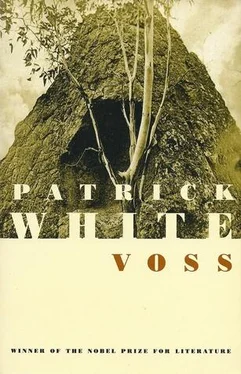Now, as winter became spring, the members of the expedition were beginning to crawl out of their cave and watch drowsily the grey water dwindle into yellow slime. They no longer blamed their sins for their predicament. Although physically weak, and disgusting to smell, their importance was returning by human leaps and bounds. Their weak eyes were contending with the stronger sun. Already the higher ground showed green promise of a good season. So the men were stretching their muscles, and flattering themselves, on the strength of their survival, that all the goodness which emanated from the earth was for their especial benefit, that it was even the fruit of their suffering, when one day a small, grey bird, whacking his beak against the bough of a tree which hung beside the entrance to the cave, seemed to cast some doubt upon their recovered confidence.
It was obvious that the fearless bird could not conceive that respect was due to men, not even as Turner shot him dead.
When Palfreyman remonstrated with the successful sportsman, the latter cheerfully replied:
‘What’s the odds! If I had not of knocked ’im off, something else would of got ’im.’
The sun was blaring with golden trumpets. Tinged with gold after weeks in the musty cave, the fellow forgot the grey louse he had always been.
So he cleared his throat and added:
‘And you scientific gentlemen should know that a bird is only a bird.’
His almost foetal eyes were twinkling. Never before had he felt himself the equal of all men.
Palfreyman was distressed.
‘Poor thing,’ he said, touching the dead bird with the tip of his toe.
‘Do not tell me you never killed a bird!’ cried Turner.
Compassion in the other had caused him to scent a weakness. Now he was perhaps even a gentleman’s superior.
‘I have killed many, to my knowledge,’ Palfreyman replied, ‘and could be responsible for much that I do not realize.’
As he spoke, it seemed that he was resigning his part in the expedition.
Turner was angry. He kicked the dead bird, so that it went shooting away across the mud and water. He himself slithered off, over rocks, in search of something else to kill, but constrained still by the great expanse of wet.
Palfreyman wished that he could have employed himself in some such easy, physical way and, in so doing, have re-discovered a purpose. There comes a moment when an individual who is too honest to take refuge in the old illusion of self-importance is suspended agonizingly between the flat sky and the flat earth, and prayer is no more than a slight gumminess on the roof of the mouth.
At this period, between flood and dry, owing to some illusion of sky and water, the earth appeared very flat indeed, particularly at early morning, when the leader of the expedition, Mr Voss, would walk out to test the ground. His trousers rolled to the middle of his calves, and wearing a stout reefer jacket, for the cold was still considerable in the early hours, he would proceed awkwardly across the mud, but soon become bogged. Then he would throw his feet to the winds, to rid them of that tragic sock. In different circumstances, he could have appeared a ridiculous figure to those watching from the shingly platform in front of the cave. Now they would not have dared laugh, for fear of the sounds that might have issued out of their mouths. Nor did they speak as much as formerly. Words that did not belong to them — illuminating, true, naked words — had a habit of coming out.
When he had gone a certain distance, the leader would perceive the folly of continuing, and stand a while, motionless upon his stilts of legs, reflected in the muddy water or watery mud. Then, I must return to those men, he would realize, and the thought of it was terrible. Nothing could have been more awful than the fact that they were men.
But a crust did form at last upon the slimy surface of the earth, and the party was able finally to ride forward.
Moreover, the land was celebrating their important presence with green grass that stroked the horses’ bellies, or lay down beneath them in green swathes. The horses snatched at the grass, until they were satisfied, or bloated, and the green scours had begun to run. Similarly, the eyes of the men became sated with the green of those parklands, although they continued to sing, like lovers or children, as they rode. They sang songs about animals that they remembered from childhood, or the vibrant songs they had hummed against their teeth as youths, waiting in the dusk against a stile. These latter songs were the more difficult to remember, in that they had never been sung for their words. The songs had poured forth in the beginning as the spasms and vibrations of the singers’ bodies.
So love and anticipation inspired the cavalcade as it passed through the green country, still practically a swamp. The passionate cries of birds exploded wonderfully overhead. The muscular forms of cool, smooth, flesh-coloured trees rose up before the advancing horsemen. Yet the men themselves, for all their freedom and their joyful songs, only remotely suggested flesh. By this time, it is true, their stock of provisions was inadequate, but an abundant supply of game had arrived to celebrate the good season. The men did take advantage of this, to catch and eat, only never more than was necessary to prolong life, for deprivation and distance had lessened their desire for food. It was foreign to their wizened stomachs. They preferred to eat dreams, but did not grow fat on these, quite the reverse.
Into this season of grass, game, and songs burst other signs of victorious life. In a patch of scrub stood a native, singing, stamping, and gesticulating with a spear, of which the barbed head suggested the snout of a crocodile. Three or four companions were grouped about the singer in the bower of scrub, but the others were more diffident, or else they lacked the gift to express their joy.
‘He is doubtless a poet,’ said Voss, who had grown quite excited. ‘What is the subject of his song, Jackie?’
But Jackie could not, or would not say. He averted his face, beneath which his throat was swelling, either with embarrassment or longing.
The enthusiasm of their leader had made several of the white men sullen.
‘There is no reason why the boy should understand their dialect,’ said Ralph Angus, and was surprised that he had thought it out for himself.
Voss, however, remained smiling and childlike.
‘Naturally,’ he replied, bearing no grudge against the individual who had censured him. ‘But I will ride over and speak with this poet.’
The stone figures of his men submitted.
Voss rode across, sustained by a belief that he must communicate intuitively with these black subjects, and finally rule them with a sympathy that was above words. In his limpid state of mind, he had no doubt that the meaning of the song would be revealed, and provide the key to all further negotiations.
But the blacks ran away, leaving the smell of their rancid bodies in the patch of scrub.
When the rejected sovereign returned, still smiling generously, and said: ‘It is curious that primitive man cannot sense the sympathy emanating from relaxed muscles and a loving heart,’ his followers did not laugh.
But their silence was worse. Each hair was distinct in their cavernous nostrils.
During the days that followed, mobs of blacks appeared to accompany the expedition. Although the natives never showed themselves in strength, several dark skins at a time would flicker through pale grass, or come to life amongst dead trees. At night there was frequent laughter, a breaking of sticks, more singing, and a thumping of the common earth.
Voss continued to question Jackie.
‘Is there no indication of their intentions?’ he asked, in some helplessness. ‘Blackfeller no tell why he come, why he sing?’
Читать дальше












